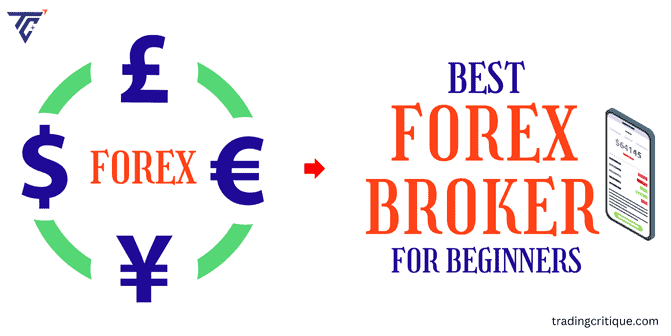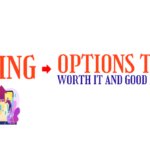New to forex trading? Don’t worry! This guide empowers you to navigate the exciting world of currency exchange. We will help you find the best US forex broker for beginners in 2024, setting you on the path to a smooth learning and potentially profitable trading experience.
But navigating the forex market as a beginner can be challenging. This guide equips you to find the perfect US forex broker tips and to avoid red flags in 2024. Start trading safely!
Quick insights
Forex brokers
Forex brokers are the largest financial market globally and act as your gateway to the forex market. This massive marketplace is where currencies are constantly traded 24/5 except on weekends and some holidays. Here, big institutions and even beginners like you can trade forex currencies, aiming to profit from their fluctuating exchange rates.
Why choose the best forex brokers for beginners?
Choosing the right forex broker sets the foundation for your trading journey. A beginner-friendly forex broker offers the support and resources you need to navigate the forex market confidently. Look for features like educational materials, user-friendly platforms, and responsive and customer support to ensure smooth learning.
Having the right US forex broker by your side can make a significant difference in your trading journey.
Benefits of forex trading
- The forex market is the largest and most liquid financial market in the world, with trillions of dollars being traded daily.
- Forex allows you to leverage your capital, which can magnify your potential returns.
- You can make money in forex trading by buying or selling currencies, depending on your prediction of their value.
- Forex brokers typically charge commissions or spreads which can be lower compared to other financial markets like stocks.
- The forex market is becoming increasingly accessible to retail traders with the rise of online brokers who offer user-friendly trading platforms.
- A user-friendly platform with clear charts, easy-to-use order placement options, and potential market analysis tools is crucial.
How to find the best forex trading brokers for beginners?
The following factors will help you find the best forex trading brokers for beginners:
- Regulation and trust
- Educational resources
- Minimum deposit and demo account
- Customer service
- Trading cost and platform usability
Regulation and trust
To choose a forex broker for beginners, regulation is the first and most crucial step to consider. It acts as your safety net in the forex market, providing peace of mind and reducing the risk of encountering fraud. Choosing a regulated broker ensures they adhere to specific rules and consumer protection measures, offering a reliable dispute resolution process should any issues arise.
Regulation helps mitigate these risks and provides a secure environment for your forex trading journey. The main regulatory agency for forex trading in the USA is the Commodity Futures Trading Commission (CFTC). If you have a problem with your broker, the CFTC provides a process for resolving disputes fairly. It is easy to verify if a forex broker is CFTC-registered.
- Visit the CFTC’s website and search for the broker’s name in their online database https://www.cftc.gov/check
- Looking for the CFTC registration number on the broker’s website. A legitimate broker will display this information prominently.
Remember, trust but verify! Always double-check a forex broker’s CFTC registration before depositing your funds.
Educational resources
A good forex broker acts as your guide, equipping you with the knowledge and tools you need to navigate the market confidently. Forex trading involves understanding various financial concepts, trading strategies, and risk management techniques. Without a solid foundation, you might struggle to make informed decisions.
Beginner-friendly resources
Look for a broker that offers resources specifically designed for beginners, presented in a concise and easy-to-understand manner.
Step-by-step tutorials
- Step-by-step tutorials explain the basics of forex trading, from understanding currency pairs to placing your first trade.
- Tutorials or guides that explain key forex concepts like currency pairs, pip values, and bid/ask spreads.
Comprehensive webinars and video guides
- Interactive webinars and video guides seek deeper into specific topics like technical analysis, fundamental analysis, and common trading strategy. These resources often feature expert insights and real-world examples.
Glossaries and FAQs
- Glossaries define technical terms used in forex trading, while FAQs address common beginner concerns.
Risk management techniques
- Forex trading involves inherent risks. Educational resources can guide you on how to manage these risks effectively to protect your capital.
Before signing up with a broker, explore their educational offerings. The resources available can significantly impact your forex trading journey.
Minimum deposit and demo account
Minimum deposit
The minimum deposit is the smallest amount of money a forex broker requires you to open a live trading account. It acts as your entry point into the market, allowing you to test the broker and gain experience before potentially investing larger sums.
Some brokers offer micro accounts specifically designed for beginners, with minimum deposits as low as $25 or even less. Research and compare the minimum deposit requirements of different brokers.
Benefits of a low minimum deposit for beginners
- Forex trading involves inherent risks. Starting small helps limit your potential losses as you learn forex trading.
- A low minimum deposit allows you to use a live account with real market conditions, practice trading strategies and get comfortable before risking more money.
- You can experience the broker’s platform, customer service, and overall trading environment with a minimal investment.
Demo account
A demo account is a trading account provided by the forex broker. It allows you to practice trading with virtual funds, without risking your capital.
Benefits of using a demo account
- Get comfortable with the broker’s trading platform, including order placement, charting tools, and other functionalities.
- Develop and test your trading strategies in a risk-free environment.
- Build confidence in your forex trading skills before entering the live market.
Starting small and managing risk is crucial for beginners in forex trading. A low minimum deposit and demo account combination allows you to gain valuable experience and build confidence before potentially increasing your investment.
Customer service
A good forex broker prioritizes customer service, ensuring you have the resources and assistance you need to trade confidently. Prompt customer service can help you troubleshoot technical difficulties or address account-related issues quickly.
Multiple contact channels
24/7 live chat
Forex markets operate around the clock, so having access to real-time support via live chat is crucial.
Phone support
While live chat is convenient, sometimes you need to speak with a representative directly. Look for brokers offering phone support with reasonable wait times.
Email support
Email is a great option for detailed inquiries that don’t require immediate response.
Languages supported
If English isn’t your primary language, check if the broker offers customer service in your native language for clear and efficient communication.
Don’t hesitate to reach out to a broker’s customer service before you sign up. Ask questions, check their response times, and assess their overall helpfulness.
Trading cost and platform usability
Choosing a forex broker involves balancing features and costs. Two crucial aspects to consider are trading fees and platform usability.
Understand the cost of forex trading
While forex trading offers the potential for profits, there are associated costs. Understanding these fees is essential for making informed trading decisions.
Spreads
This is the difference between the bid (buying) and ask (selling) price of a currency pair. It is essentially the broker’s commission for facilitating your trade. Look for brokers with tight spreads for lower trading costs.
Commissions
Some brokers charge a fixed commission per trade, on top of the spread. It can be a fixed amount per trade or a portion of the trade’s total value.
Swap fees
If you hold a position open overnight, you might charge swap fees. This is the interest charged or credited for holding a currency position.
Inactivity fees
Several forex brokers offer accounts with no inactivity fees. This is a good option for beginners who might not be trading regularly.
Choose a forex broker that is transparent about all their trading fees. Make sure the fees are mentioned on their website and there are no hidden charges. This will help you compare brokers effectively and choose one that best suits your trading style and budget.
Platform usability
A user-friendly platform is vital for a smooth and successful forex trading journey. The most popular used platforms in the USA are MT4, MT5, c Trader, and proprietary platforms. The good forex trading platforms have the following.
Advanced charting tools
Technical analysis plays a key role in forex trading. Look for platforms offering a variety of charting tools and indicators to analyze market trends and make informed decisions.
Multiple order types
A good platform allows you to place various order types, such as stop-loss and take-profit orders, to manage your risk and potential profits.
Market research and news
Staying informed about economic data and market news is crucial. A platform with integrated news feeds and market analysis tools can be an asset.
Mobile compatibility
The ability to trade on the go can be convenient. Look for a platform accessible through a user-friendly mobile app.
By understanding these key factors and considering your own trading needs, you can choose a forex broker that offers a competitive fee structure and a user-friendly platform to empower your trading journey.
Additional factors to be considered
Some of the additional factors to be considered are given below:
- Account types
- Deposit/withdrawal methods
- Currency pairs
Account types
Some forex brokers offer various account types tailored to different trading needs and experience levels. These can include:
- Standard accounts – Suitable for beginners, offering basic features and lower minimum deposits.
- Advanced accounts – Designed for experienced traders with advanced features and potentially higher margin requirements.
- Islamic accounts – This account follows Islamic finance principles for swap-free trading.
Explore the different account types a broker offers to find one that aligns with your trading goals and risk tolerance.
Deposit/withdrawal methods
Before choosing a forex broker, consider the deposit and withdrawal methods they offer. Look for a broker that provides convenient and accessible options for you.
- Bank transfer – A secure and reliable option, but transfers can take several business days.
- Credit/debit card – A fast and convenient way to deposit funds, but some brokers might charge fees for card transactions.
- E-wallets – Popular options like PayPal or Skrill offer near-instant deposits and withdrawals, but fees may apply.
Choose a broker with deposit/withdrawal methods that suit your preferences and ensure they align with your preferred payment methods to avoid any hassles.
Currency pairs
EUR/USD is the most traded currency pair globally, known for its high liquidity and relatively stable price movements. Currency pairs offered by the brokers in the USA are listed below:
- Major – These are the most heavily traded and liquid pairs in the Forex market. They involve the U.S. dollar (USD) paired against other major world currencies. It is more suitable for beginners.
- Minor – Minor currency pairs involve a major currency (like USD, EUR, GBP, or JPY) paired against a less commonly traded currency.
- Exotic – Exotic currency pairs involve a major currency paired against the currency of an emerging market or a less-established economy. They can be highly volatile and may have wider spreads.
By considering these additional factors alongside the main factors mentioned earlier, you can make an even more informed decision when choosing a forex broker as a beginner in the USA.
Red flags to avoid
Don’t be scammed! Learn red flags to spot forex broker scams. The red flags of the forex scam are listed below:
- Unregulated broker
- Lack of clarity
- Assurance of high profits
- Fake testimonials
- Ignoring to withdrawal of funds
- Unsolicited calls
- Unusual trading practices
Conclusion
The exciting world of forex trading awaits! By following the steps outlined in this guide and carefully considering the factors mentioned above, you will be well-equipped to choose a forex broker that aligns with your trading goals and experience level.
Remember, forex trading involves inherent risks, so prioritize education, start small, and manage your risk effectively. This guide serves as a starting point. Responsible research and ongoing learning are crucial for success in forex trading. So, equip yourself with knowledge, choose your broker wisely, and start trading forex!
Pro Tip
Start your forex trading journey today by exploring the top US forex brokers for beginners! Visit our trusted forex broker site if you are a beginner or want to broaden your knowledge of investment instruments such as stocks, bonds, mutual funds, and cryptocurrencies.
FAQs-Frequently Asked Questions
1. How to open a forex broker?
To open an account with a forex broker are given below:
- Choose a forex broker
- Visit the broker’s website
- Fill out the application form
- Verify your identity
- Fund your account
- Start trading
2. How to withdraw my funds from the forex broker?
- Log in to your account
- Go to the withdrawal section
- Choose the withdrawal methods
- Enter the amount
- Submit your request
3. What is the minimum deposit required for forex trading?
The minimum deposit to open a live forex trading account can vary from broker to broker, typically ranging from $250 to $10,000.
4. Is forex trading a good way to get rich quickly?
No, forex trading is not to get rich quickly, because it involves inherent risks and requires knowledge and experience to be successful. Many beginners lose money, especially if they lack a proper trading plan and risk management strategies.
5. What are the tips for beginner success in forex trading?
- Practice with a demo account
- Start with a small investment
- Focus on risk management
- Gain knowledge about forex
- Develop a trading plan








